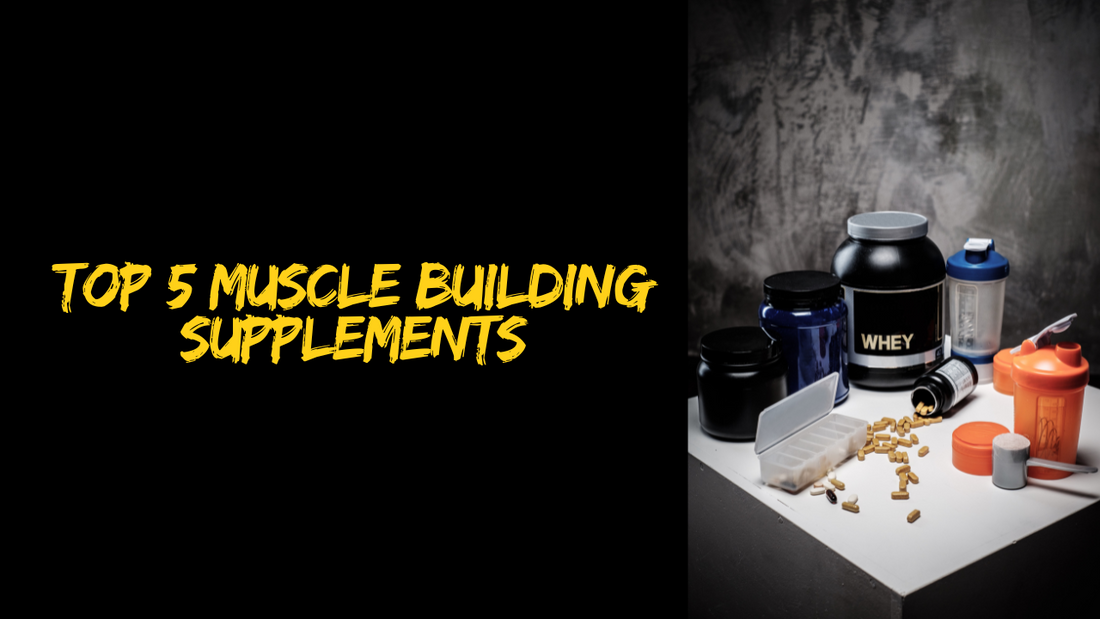If you’re working hard in the gym and sticking to your diet but not seeing the muscle growth you expected, supplements might be the extra boost you need. But with so many options out there, how do you know which ones are worth your time and money? In this post, we’ll dive deep into the top 5 supplements for muscle growth, based on science, and explain how they can help you achieve your fitness goals faster.
Creatine: The King of Muscle-Building Supplements
When it comes to supplements for muscle growth, creatine is the most researched and widely recommended. Creatine helps your muscles produce more energy during high-intensity workouts, which allows you to push harder and lift more. The result? More muscle growth.
How it works: Creatine increases your body’s stores of phosphocreatine, which helps regenerate the ATP (adenosine triphosphate) your muscles need to contract. This boosts strength, power, and muscle mass.
Benefits:
- Increased strength and muscle mass: Studies have shown that creatine can increase muscle mass by about 5-10% over several months (Buford et al., 2007).
- Faster recovery: Creatine can also help with post-workout recovery, reducing muscle soreness and fatigue.
How to use: Start with a loading phase of 20 grams per day for 5-7 days, followed by a maintenance dose of 3-5 grams daily.
Protein Powder: Essential for Muscle Repair and Growth
Protein is the building block of muscle. After a workout, your muscles need protein to repair and grow. While you can get protein from whole foods, protein powder offers a convenient way to ensure you’re getting enough to meet your muscle-building needs.
Types of protein powders:
- Whey protein: Fast-absorbing and great for post-workout recovery.
- Casein protein: Slow-digesting, perfect for nighttime recovery.
- Plant-based protein: A great option for vegans or those with dairy sensitivities.
Benefits:
- Muscle recovery: Protein intake post-workout significantly boosts muscle protein synthesis (Tang et al., 2009).
- Convenient and effective: Protein shakes help you meet your daily protein goals, which is essential for muscle growth.
How to use: Aim for 1-2 scoops of protein powder after your workout or as needed to reach your daily protein goals.
BCAAs: Branched-Chain Amino Acids for Recovery
BCAAs (branched-chain amino acids) consist of leucine, isoleucine, and valine—three essential amino acids your body needs for muscle growth. BCAAs are particularly popular for reducing muscle soreness and preventing muscle breakdown during intense training.
How it works: BCAAs help stimulate muscle protein synthesis and reduce protein breakdown, making them great for recovery.
Benefits:
- Reduced muscle soreness: BCAAs can reduce delayed onset muscle soreness (DOMS) after a tough workout (Jackman et al., 2010).
- Faster recovery: If you train fasted or do high-intensity workouts, BCAAs can support muscle repair and reduce fatigue.
How to use: Take 5-10 grams of BCAAs before or during your workout for best results.
Beta-Alanine: Boost Endurance and Delay Fatigue
Beta-alanine is a non-essential amino acid that helps buffer acid in your muscles during high-intensity exercise, allowing you to work out harder for longer. This supplement is particularly useful if you do high-rep weightlifting or endurance exercises.
How it works: Beta-alanine increases muscle levels of carnosine, which helps neutralize lactic acid buildup in your muscles, reducing fatigue.
Benefits:
- Improved endurance: Studies show that beta-alanine can improve endurance during exercises lasting 1-4 minutes (Hoffman et al., 2008).
- Increased muscle performance: It helps you squeeze out those extra reps when fatigue starts to kick in.
How to use: Take 2-5 grams of beta-alanine daily, and be patient—it can take a few weeks to start noticing the benefits.
Glutamine: Recovery and Immune Support
Glutamine is an amino acid that plays a key role in muscle recovery and immune function. While it’s not as heavily researched for muscle growth as creatine or protein, it can help with recovery, especially if you’re training intensely.
How it works: Glutamine helps repair muscle tissue and supports your immune system, which can be taxed by intense training.
Benefits:
- Improved recovery: Some studies suggest glutamine can aid in muscle recovery and reduce soreness after intense training (Poppendieck et al., 2016).
- Supports immune health: Hard training can weaken your immune system, and glutamine may help prevent this.
How to use: Take 5 grams of glutamine post-workout or before bed to aid in recovery.
Which Supplement is Right for You?
When it comes to muscle growth, the right supplements can make a significant difference in your progress. Here’s a quick recap of what we’ve covered:
- Creatine is perfect if you want to increase strength and muscle mass.
- Protein powder ensures your muscles get the fuel they need to grow.
- BCAAs can help with recovery and reduce soreness.
- Beta-alanine boosts endurance and helps you push through tough workouts.
- Glutamine aids recovery and supports your immune system.
Remember, supplements should complement your hard work in the gym and a balanced diet, not replace them. If you’re unsure where to start, begin with creatine and protein powder—these two are the most effective and well-researched options for building muscle.
If you’re looking for personalized coaching or a custom workout plan to help you reach your goals faster, visit my website: dushyantatomar.com. Let’s work together to take your fitness journey to the next level!
FAQ Section
- Do I need supplements to build muscle?
Supplements aren’t essential, but they can help enhance your results when combined with a proper diet and workout routine.
- How much protein should I consume daily?
Although it depends on the intensity of your training but aim for 1.5 - 2.5 grams of protein per kilogram of body weight to support muscle growth.
- Is creatine safe?
Yes, creatine is one of the safest and most researched supplements available. It’s safe for long-term use if taken within recommended dosages.
References:
- Buford, T. W., Kreider, R. B., Stout, J. R., Greenwood, M., Campbell, B., Spano, M., Ziegenfuss, T., López, H. L., Landis, J., & Antonio, J. (2007). International Society of Sports Nutrition position stand: creatine supplementation and exercise. Journal of the International Society of Sports Nutrition, 4(1), 6.
- Tang, J. E., Moore, D. R., Kujbida, G. W., Tarnopolsky, M. A., & Phillips, S. M. (2009). Ingestion of whey hydrolysate, casein, or soy protein isolate: effects on mixed muscle protein synthesis at rest and following resistance exercise in young men. American Journal of Clinical Nutrition, 89(1), 161-168.
- Jackman, S. R., Witard, O. C., Jeukendrup, A. E., & Tipton, K. D. (2010). Branched-chain amino acid ingestion can ameliorate soreness from eccentric exercise. Medicine & Science in Sports & Exercise, 42(5), 962-970.
- Hoffman, J. R., Ratamess, N. A., Faigenbaum, A. D., Ross, R., Kang, J., & Wise, J. A. (2008). Short-duration beta-alanine supplementation increases training volume and reduces subjective feelings of fatigue in college football players. Nutrition Research, 28(1), 31-35.
- Poppendieck, W., Faude, O., Wegmann, M., & Meyer, T. (2016). Cooling and performance recovery of trained athletes: A meta-analytical review. International Journal of Sports Medicine, 37(11), 873-883.


